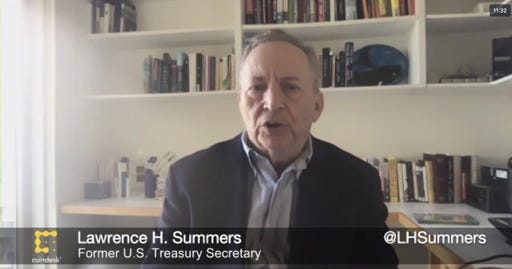No consensus on CBDCs
Earlier this year, Jeff Wilser was kind enough to write an article about me called “The Man Who Forecast a Currency Cold War” for Coindesk in the run-up to the annual Consensus blockchain conference, which is sort of like SIBOS but for blockchainers rather than bankers.
Consensus Distributed 2020
It is an annual event in New York and, like many other events, it went virtual this year. I took part in the “Money Re-imagined” session with Michael Casey. Mike chatted to former Treasury Secretary Larry Summers (who is on record as saying that the US should invest in improving SWIFT rather than a digital dollar), digital dollar visionary Chris Giancarlo, Dante Disparte of the Libra Foundation and crypto-industry luminaries Joe Lubin and Caitlin Long. I took part in a discussion with Sheila Warren of the World Economic Forum.
Larry Summers said there may be “too much privacy” in payments.
(If you are curious, I used this discussion session as a case study for my new Fintech Writer’s Workshop video series, so do head over to my Youtube channel DaveFlix and take a look.)
Yves Mersch talked about using tokens to implement CBDC.
What particularly caught my eye was the contribution of Yves Mersch from the European Central Bank who talked about the idea of using tokens to implement a Central Bank Digital Currency (CBDC). When I first wrote about this a few years ago, it was probably seen as something out of left-field but by the time I gave a talk about it at the Blockchain Innovation Conference in 2018 it had become if not mainstream, exactly, certainly a topic for discussion in polite society, so it was very interesting to see such a well-informed “insider” talk about this approach.
[bctt tweet="More likely are the use-cases that don’t even exist today and can’t exist without smart money" username=""]
Anyway, the reason that was thinking about Yves’ comments was that Martin Walker, Director of Banking and Finance at the Center for Evidence-Based Management wrote a great piece exploring these issues for the LSE Business Review. He reflects on the idea of using some form shared ledger, digital asset tokens and “smart” “contracts” to implement a digital currency, what I referred to in my book “Before Babylon, Beyond Bitcoin” as smart money, and quotes Robert Sams points on the potential for innovation: “More likely are the use-cases that don’t even exist today and can’t exist without [smart money]”. I am very sympathetic to this view and can’t help but feel that this is where we should focus. Walker goes on to observe that while there probably is scope to "create more mechanisms for adding more conditionality in the financial system, locking up funds until an event happens or creating more easily accessible escrow arrangements” it is not obvious that autonomous consensus applications are the best way forward. Indeed, the early lessons learned from the world of “decentralised finance” (or “DeFi”) suggest that there’s a lot of work to be done to bring working, population-scale schemes to fruition.
I think Martin's words of caution are entirely justified but along with Yves, I also think that the concepts should be explored. Yes, we could implement digital currency without tokens, but if we are going to create digital currency, then surely we want it to be a platform for new products and services, designed for the economy to come and not simply an mimetic electronic echo of what we already have?
~~
Are you looking for:
A speaker/moderator for your online or in person event?
Written content or contribution for your publication?
A trusted advisor for your company’s board?
Some comment on the latest digital financial services news/media?





